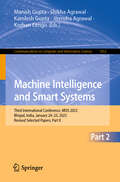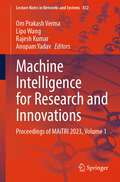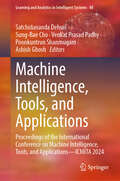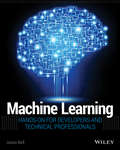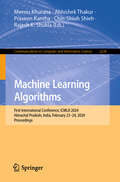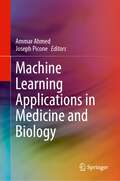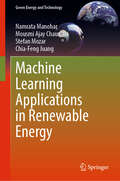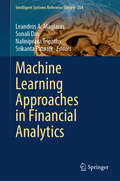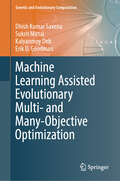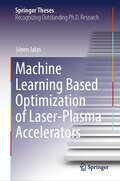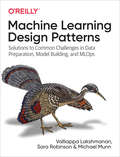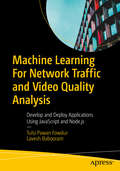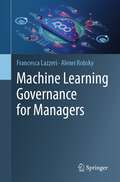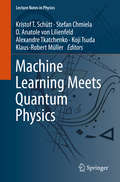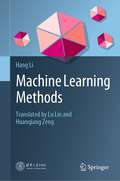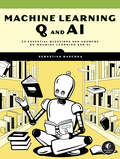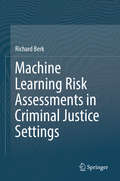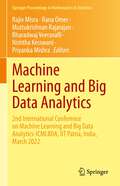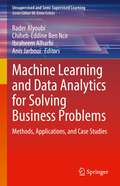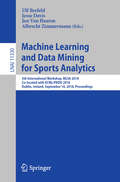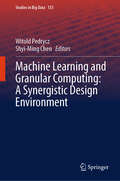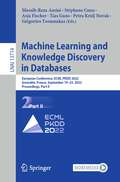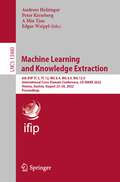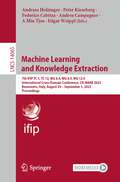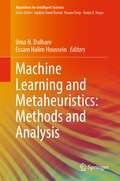- Table View
- List View
Machine Intelligence and Smart Systems: Third International Conference, MISS 2023, Bhopal, India, January 24–25, 2023, Revised Selected Papers, Part II (Communications in Computer and Information Science #1952)
by Jitendra Agrawal Manish Gupta Shikha Agrawal Kamlesh Gupta Korhan CengisThe two-volume set CCIS 1951 and 1952 constitutes the refereed post-conference proceedings of the Third International Conference on Machine Intelligence and Smart Systems, MISS 2023, Bhopal, India, during January 24-25, 2023. The 58 full papers included in this book were carefully reviewed and selected from 203 submissions. They were organized in topical sections as follows: Language processing; Recent trends; AI defensive schemes; Principle components; Deduction and prevention models.
Machine Intelligence for Research and Innovations: Proceedings of MAiTRI 2023, Volume 1 (Lecture Notes in Networks and Systems #832)
by Anupam Yadav Rajesh Kumar Lipo Wang Om Prakash VermaThe book is a collection of high-quality peer-reviewed research papers presented in the First International Conference on MAchine inTelligence for Research & Innovations (MAiTRI 2023 Summit), held at Dr. B. R. Ambedkar National Institute of Technology Jalandhar, Panjab, India during 1 – 3 September 2023. This book focuses on recent advancement in the theory and realization of machine intelligence (MI) and their tools and growing applications such as machine learning, deep learning, quantum machine learning, real-time computer vision, pattern recognition, natural language processing, statistical modelling, autonomous vehicles, human interfaces, computational intelligence, and robotics.
Machine Intelligence, Tools, and Applications: Proceedings of the International Conference on Machine Intelligence, Tools, and Applications—ICMITA 2024 (Learning and Analytics in Intelligent Systems #40)
by Satchidananda Dehuri Ashish Ghosh Sung-Bae Cho Venkat Prasad Padhy Poonkuntrun ShanmugamThis book presents the recent advances including tools and techniques in the constantly changing landscape of machine learning (ML). This would enable the readers with a strong understanding of critical issues in ML by providing both broad and detailed perspectives on cutting-edge theories, algorithms, and tools. This will become a single source of reference on conceptual, methodological, technical, and managerial issues, as well as provide insight into emerging trends and future opportunities in the discipline of ML. This book contains altogether 36 chapters in the area of ML and its applications.
Machine Learning
by Jason BellDig deep into the data with a hands-on guide to machine learningMachine Learning: Hands-On for Developers and Technical Professionals provides hands-on instruction and fully-coded working examples for the most common machine learning techniques used by developers and technical professionals. The book contains a breakdown of each ML variant, explaining how it works and how it is used within certain industries, allowing readers to incorporate the presented techniques into their own work as they follow along. A core tenant of machine learning is a strong focus on data preparation, and a full exploration of the various types of learning algorithms illustrates how the proper tools can help any developer extract information and insights from existing data. The book includes a full complement of Instructor's Materials to facilitate use in the classroom, making this resource useful for students and as a professional reference.At its core, machine learning is a mathematical, algorithm-based technology that forms the basis of historical data mining and modern big data science. Scientific analysis of big data requires a working knowledge of machine learning, which forms predictions based on known properties learned from training data. Machine Learning is an accessible, comprehensive guide for the non-mathematician, providing clear guidance that allows readers to:Learn the languages of machine learning including Hadoop, Mahout, and WekaUnderstand decision trees, Bayesian networks, and artificial neural networksImplement Association Rule, Real Time, and Batch learningDevelop a strategic plan for safe, effective, and efficient machine learningBy learning to construct a system that can learn from data, readers can increase their utility across industries. Machine learning sits at the core of deep dive data analysis and visualization, which is increasingly in demand as companies discover the goldmine hiding in their existing data. For the tech professional involved in data science, Machine Learning: Hands-On for Developers and Technical Professionals provides the skills and techniques required to dig deeper.
Machine Learning Algorithms: First International Conference, ICMLA 2024, Himachal Pradesh, India, February 23–24, 2024, Proceedings (Communications in Computer and Information Science #2238)
by Abhishek Thakur Rajesh K. Shukla Chin-Shiuh Shieh Meenu Khurana Praveen KanthaThis book constitutes the refereed proceedings of the First International Conference on Machine Learning Algorithms, ICMLA 2024, held in Himachal Pradesh, India, during February 23–24, 2024. The 23 full papers and 17 short papers included in this book were carefully reviewed and selected from 400 submissions. They were organized in the following topical sections: machine learning; image processing; deep learning.
Machine Learning Applications in Medicine and Biology
by Joseph Picone Ammar AhmedThis book combines selected papers from the 2022 IEEE Signal Processing in Medicine and Biology Symposium (IEEE SPMB) held at Temple University. The symposium presents multidisciplinary research in the life sciences. Topics covered include:Signal and image analysis (EEG, ECG, MRI)Machine learningData mining and classificationBig data resourcesApplications of particular interest at the 2022 symposium included digital pathology, computational biology, and quantum computing. The book features tutorials and examples of successful applications that will appeal to a wide range of professionals and researchers in signal processing, medicine, and biology.
Machine Learning Applications in Renewable Energy (Green Energy and Technology)
by Stefan Mozar Mousmi Ajay Chaurasia Chia-Feng Juang Namrata ManoharThis book presents the need for Renewable Energy Technologies (RET) in the context of providing a solution for the depletion of conventional resources, protecting the environment and enhancing the economic situation of a country by way of providing employment opportunities for many people may be as employees in various roles or initiating their own enterprise. The book includes statistics on energy consumption changes over the past few decades from conventional to renewable energies. The future scenario of energy in view of technological advancements and the employment status past, present and future is indicated. The need and importance of standards for the efficient operation of renewable energy systems are explained. The various modern technologies that are enabling the successful implementation of RET are presented. The role of the public and government and the various financial schemes governments provide is highlighted. A few modern applications and those under development would enhance the standard of living. The statistics and situation of the various aspects in the wake of the COVID-19 pandemic before, during and future effects are discussed, for the overall benefit of one and all. The various methods of a cost analysis of a project are indicated. Solar system components and the cost estimation of the solar power system in the present-day market status are provided. The various grid integration issues have been discussed.
Machine Learning Approaches in Financial Analytics (Intelligent Systems Reference Library #254)
by Srikanta Patnaik Leandros A. Maglaras Sonali Das Naliniprava TripathyThis book addresses the growing need for a comprehensive guide to the application of machine learning in financial analytics. It offers a valuable resource for both beginners and experienced professionals in finance and data science by covering the theoretical foundations, practical implementations, ethical considerations, and future trends in the field. It bridges the gap between theory and practice, providing readers with the tools and knowledge they need to leverage the power of machine learning in the financial sector responsibly.
Machine Learning Assisted Evolutionary Multi- and Many- Objective Optimization (Genetic and Evolutionary Computation)
by Kalyanmoy Deb Dhish Kumar Saxena Sukrit Mittal Erik D. GoodmanThis book focuses on machine learning (ML) assisted evolutionary multi- and many-objective optimization (EMâO). EMâO algorithms, namely EMâOAs, iteratively evolve a set of solutions towards a good Pareto Front approximation. The availability of multiple solution sets over successive generations makes EMâOAs amenable to application of ML for different pursuits. Recognizing the immense potential for ML-based enhancements in the EMâO domain, this book intends to serve as an exclusive resource for both domain novices and the experienced researchers and practitioners. To achieve this goal, the book first covers the foundations of optimization, including problem and algorithm types. Then, well-structured chapters present some of the key studies on ML-based enhancements in the EMâO domain, systematically addressing important aspects. These include learning to understand the problem structure, converge better, diversify better, simultaneously converge and diversify better, and analyze the Pareto Front. In doing so, this book broadly summarizes the literature, beginning with foundational work on innovization (2003) and objective reduction (2006), and extending to the most recently proposed innovized progress operators (2021-23). It also highlights the utility of ML interventions in the search, post-optimality, and decision-making phases pertaining to the use of EMâOAs. Finally, this book shares insightful perspectives on the future potential for ML based enhancements in the EMâOA domain.To aid readers, the book includes working codes for the developed algorithms. This book will not only strengthen this emergent theme but also encourage ML researchers to develop more efficient and scalable methods that cater to the requirements of the EMâOA domain. It serves as an inspiration for further research and applications at the synergistic intersection of EMâOA and ML domains.
Machine Learning Based Optimization of Laser-Plasma Accelerators (Springer Theses)
by Sören JalasThis book explores the application of machine learning-based methods, particularly Bayesian optimization, within the realm of laser-plasma accelerators. The book involves the implementation of Bayesian optimization to fine tune the parameters of the lux accelerator, encompassing simulations and real-time experimentation. In combination, the methods presented in this book provide valuable tools for effectively managing the inherent complexity of LPAs, spanning from the design phase in simulations to real-time operation, potentially paving the way for LPAs to cater to a wide array of applications with diverse demands.
Machine Learning Design Patterns
by Michael Munn Valliappa Lakshmanan Sara RobinsonThe design patterns in this book capture best practices and solutions to recurring problems in machine learning. The authors, three Google engineers, catalog proven methods to help data scientists tackle common problems throughout the ML process. These design patterns codify the experience of hundreds of experts into straightforward, approachable advice.In this book, you will find detailed explanations of 30 patterns for data and problem representation, operationalization, repeatability, reproducibility, flexibility, explainability, and fairness. Each pattern includes a description of the problem, a variety of potential solutions, and recommendations for choosing the best technique for your situation.You'll learn how to:Identify and mitigate common challenges when training, evaluating, and deploying ML modelsRepresent data for different ML model types, including embeddings, feature crosses, and moreChoose the right model type for specific problemsBuild a robust training loop that uses checkpoints, distribution strategy, and hyperparameter tuningDeploy scalable ML systems that you can retrain and update to reflect new dataInterpret model predictions for stakeholders and ensure models are treating users fairly
Machine Learning For Network Traffic and Video Quality Analysis: Develop and Deploy Applications Using JavaScript and Node.js
by Tulsi Pawan Fowdur Lavesh BabooramThis book offers both theoretical insights and hands-on experience in understanding and building machine learning-based Network Traffic Monitoring and Analysis (NTMA) and Video Quality Assessment (VQA) applications using JavaScript. JavaScript provides the flexibility to deploy these applications across various devices and web browsers. The book begins by delving into NTMA, explaining fundamental concepts and providing an overview of existing applications and research within this domain. It also goes into the essentials of VQA and offers a survey of the latest developments in VQA algorithms. The book includes a thorough examination of machine learning algorithms that find application in both NTMA and VQA, with a specific emphasis on classification and prediction algorithms such as the Multi-Layer Perceptron and Support Vector Machine. The book also explores the software architecture of the NTMA client-server application. This architecture is meticulously developed using HTML, CSS, Node.js, and JavaScript. Practical aspects of developing the Video Quality Assessment (VQA) model using JavaScript and Java are presented. Lastly, the book provides detailed guidance on implementing a complete system model that seamlessly merges NTMA and VQA into a unified web application, all built upon a client-server paradigm. By the end of the book, you will understand NTMA and VQA concepts and will be able to apply machine learning to both domains and develop and deploy your own NTMA and VQA applications using JavaScript and Node.js. What You Will Learn What are the fundamental concepts, existing applications, and research on NTMA? What are the existing software and current research trends in VQA? Which machine learning algorithms are used in NTMA and VQA? How do you develop NTMA and VQA web-based applications using JavaScript, HTML, and Node.js? Who This Book Is For Software professionals and machine learning engineers involved in the fields of networking and telecommunications
Machine Learning Governance for Managers
by Francesca Lazzeri Alexei RobskyMachine Learning Governance for Managers provides readers with the knowledge to unlock insights from data and leverage AI solutions. In today's business landscape, most organizations face challenges in scaling and maintaining a sustainable machine learning model lifecycle. This book offers a comprehensive framework that covers business requirements, data generation and acquisition, modeling, model deployment, performance measurement, and management, providing a range of methodologies, technologies, and resources to assist data science managers in adopting data and AI-driven practices. Particular emphasis is given to ramping up a solution quickly, detailing skills and techniques to ensure the right things are measured and acted upon for reliable results and high performance. Readers will learn sustainable tools for implementing machine learning with existing IT and privacy policies, including versioning all models, creating documentation, monitoring models and their results, and assessing their causal business impact. By overcoming these challenges, bottom-line gains from AI investments can be realized. Organizations that implement all aspects of AI/ML model governance can achieve a high level of control and visibility over how models perform in production, leading to improved operational efficiency and a higher ROI on AI investments. Machine Learning Governance for Managers helps to effectively control model inputs and understand all the variables that may impact your results. Don't let challenges in machine learning hinder your organization's growth - unlock its potential with this essential guide.
Machine Learning Meets Quantum Physics (Lecture Notes in Physics #968)
by Klaus-Robert Müller Kristof T. Schütt Stefan Chmiela O. Anatole von Lilienfeld Alexandre Tkatchenko Koji TsudaDesigning molecules and materials with desired properties is an important prerequisite for advancing technology in our modern societies. This requires both the ability to calculate accurate microscopic properties, such as energies, forces and electrostatic multipoles of specific configurations, as well as efficient sampling of potential energy surfaces to obtain corresponding macroscopic properties. Tools that can provide this are accurate first-principles calculations rooted in quantum mechanics, and statistical mechanics, respectively. Unfortunately, they come at a high computational cost that prohibits calculations for large systems and long time-scales, thus presenting a severe bottleneck both for searching the vast chemical compound space and the stupendously many dynamical configurations that a molecule can assume. To overcome this challenge, recently there have been increased efforts to accelerate quantum simulations with machine learning (ML). This emerging interdisciplinary community encompasses chemists, material scientists, physicists, mathematicians and computer scientists, joining forces to contribute to the exciting hot topic of progressing machine learning and AI for molecules and materials. The book that has emerged from a series of workshops provides a snapshot of this rapidly developing field. It contains tutorial material explaining the relevant foundations needed in chemistry, physics as well as machine learning to give an easy starting point for interested readers. In addition, a number of research papers defining the current state-of-the-art are included. The book has five parts (Fundamentals, Incorporating Prior Knowledge, Deep Learning of Atomistic Representations, Atomistic Simulations and Discovery and Design), each prefaced by editorial commentary that puts the respective parts into a broader scientific context.
Machine Learning Methods
by Hang LiThis book provides a comprehensive and systematic introduction to the principal machine learning methods, covering both supervised and unsupervised learning methods. It discusses essential methods of classification and regression in supervised learning, such as decision trees, perceptrons, support vector machines, maximum entropy models, logistic regression models and multiclass classification, as well as methods applied in supervised learning, like the hidden Markov model and conditional random fields. In the context of unsupervised learning, it examines clustering and other problems as well as methods such as singular value decomposition, principal component analysis and latent semantic analysis. As a fundamental book on machine learning, it addresses the needs of researchers and students who apply machine learning as an important tool in their research, especially those in fields such as information retrieval, natural language processing and text data mining. In order to understand the concepts and methods discussed, readers are expected to have an elementary knowledge of advanced mathematics, linear algebra and probability statistics. The detailed explanations of basic principles, underlying concepts and algorithms enable readers to grasp basic techniques, while the rigorous mathematical derivations and specific examples included offer valuable insights into machine learning.
Machine Learning Q and AI: 30 Essential Questions and Answers on Machine Learning and AI
by Sebastian RaschkaLearn the answers to 30 cutting-edge questions in machine learning and AI and level up your expertise in the field.If you&’re ready to venture beyond introductory concepts and dig deeper into machine learning, deep learning, and AI, the question-and-answer format of Machine Learning Q and AI will make things fast and easy for you, without a lot of mucking about.Born out of questions often fielded by author Sebastian Raschka, the direct, no-nonsense approach of this book makes advanced topics more accessible and genuinely engaging. Each brief, self-contained chapter journeys through a fundamental question in AI, unraveling it with clear explanations, diagrams, and hands-on exercises.WHAT'S INSIDE:FOCUSED CHAPTERS: Key questions in AI are answered concisely, and complex ideas are broken down into easily digestible parts.WIDE RANGE OF TOPICS: Raschka covers topics ranging from neural network architectures and model evaluation to computer vision and natural language processing.PRACTICAL APPLICATIONS: Learn techniques for enhancing model performance, fine-tuning large models, and more.You&’ll also explore how to:• Manage the various sources of randomness in neural network training• Differentiate between encoder and decoder architectures in large language models• Reduce overfitting through data and model modifications• Construct confidence intervals for classifiers and optimize models with limited labeled data• Choose between different multi-GPU training paradigms and different types of generative AI models• Understand performance metrics for natural language processing• Make sense of the inductive biases in vision transformersIf you&’ve been on the hunt for the perfect resource to elevate your understanding of machine learning, Machine Learning Q and AI will make it easy for you to painlessly advance your knowledge beyond the basics.
Machine Learning Risk Assessments in Criminal Justice Settings
by Richard BerkThis book puts in one place and in accessible form Richard Berk’s most recent work on forecasts of re-offending by individuals already in criminal justice custody. Using machine learning statistical procedures trained on very large datasets, an explicit introduction of the relative costs of forecasting errors as the forecasts are constructed, and an emphasis on maximizing forecasting accuracy, the author shows how his decades of research on the topic improves forecasts of risk. Criminal justice risk forecasts anticipate the future behavior of specified individuals, rather than “predictive policing” for locations in time and space, which is a very different enterprise that uses different data different data analysis tools. The audience for this book includes graduate students and researchers in the social sciences, and data analysts in criminal justice agencies. Formal mathematics is used only as necessary or in concert with more intuitive explanations.
Machine Learning and Big Data Analytics: 2nd International Conference on Machine Learning and Big Data Analytics-ICMLBDA, IIT Patna, India, March 2022 (Springer Proceedings in Mathematics & Statistics #401)
by Bharadwaj Veeravalli Rajiv Misra Muttukrishnan Rajarajan Nishtha Kesswani Rana Omer Priyanka MishraThis edited volume on machine learning and big data analytics (Proceedings of ICMLBDA 2022) is intended to be used as a reference book for researchers and professionals to share their research and reports of new technologies and applications in Machine Learning and Big Data Analytics like biometric Recognition Systems, medical diagnosis, industries, telecommunications, AI Petri Nets Model-Based Diagnosis, gaming, stock trading, Intelligent Aerospace Systems, robot control, law, remote sensing and scientific discovery agents and multiagent systems; and natural language and Web intelligence. The intent of this book is to provide awareness of algorithms used for machine learning and big data in the advanced Scientific Technologies, provide a correlation of multidisciplinary areas and become a point of great interest for Data Scientists, systems architects, developers, new researchers and graduate level students. This volume provides cutting-edge research from around the globe on this field. Current status, trends, future directions, opportunities, etc. are discussed, making it friendly for beginners and young researchers.
Machine Learning and Data Analytics for Solving Business Problems: Methods, Applications, and Case Studies (Unsupervised and Semi-Supervised Learning)
by Bader Alyoubi Chiheb-Eddine Ben Ncir Ibraheem Alharbi Anis JarbouiThis book presents advances in business computing and data analytics by discussing recent and innovative machine learning methods that have been designed to support decision-making processes. These methods form the theoretical foundations of intelligent management systems, which allows for companies to understand the market environment, to improve the analysis of customer needs, to propose creative personalization of contents, and to design more effective business strategies, products, and services. This book gives an overview of recent methods – such as blockchain, big data, artificial intelligence, and cloud computing – so readers can rapidly explore them and their applications to solve common business challenges. The book aims to empower readers to leverage and develop creative supervised and unsupervised methods to solve business decision-making problems.
Machine Learning and Data Mining for Sports Analytics: 5th International Workshop, MLSA 2018, Co-located with ECML/PKDD 2018, Dublin, Ireland, September 10, 2018, Proceedings (Lecture Notes in Computer Science #11330)
by Jesse Davis Ulf Brefeld Jan Van Haaren Albrecht ZimmermannThis book constitutes the refereed post-conference proceedings of the 5th International Workshop on Machine Learning and Data Mining for Sports Analytics, MLSA 2018, colocated with ECML/PKDD 2018, in Dublin, Ireland, in September 2018.The 12 full papers presented together with 4 challenge papers were carefully reviewed and selected from 24 submissions. The papers present a variety of topics, covering the team sports American football, basketball, ice hockey, and soccer, as well as the individual sports cycling and martial arts. In addition, four challenge papers are included, reporting on how to predict pass receivers in soccer.
Machine Learning and Granular Computing: A Synergistic Design Environment (Studies in Big Data #155)
by Witold Pedrycz Shyi-Ming ChenThis volume provides the reader with a comprehensive and up-to-date treatise positioned at the junction of the areas of Machine Learning (ML) and Granular Computing (GrC). ML offers a wealth of architectures and learning methods. Granular Computing addresses useful aspects of abstraction and knowledge representation that are of importance in the advanced design of ML architectures. In unison, ML and GrC support advances of the fundamental learning paradigm. As built upon synergy, this unified environment focuses on a spectrum of methodological and algorithmic issues, discusses implementations and elaborates on applications. The chapters bring forward recent developments showing ways of designing synergistic and coherently structured ML-GrC environment. The book will be of interest to a broad audience including researchers and practitioners active in the area of ML or GrC and interested in following its timely trends and new pursuits.
Machine Learning and Knowledge Discovery in Databases: European Conference, ECML PKDD 2022, Grenoble, France, September 19–23, 2022, Proceedings, Part II (Lecture Notes in Computer Science #13714)
by Massih-Reza Amini Petra Kralj Novak Grigorios Tsoumakas Stéphane Canu Asja Fischer Tias GunsThe multi-volume set LNAI 13713 until 13718 constitutes the refereed proceedings of the European Conference on Machine Learning and Knowledge Discovery in Databases, ECML PKDD 2022, which took place in Grenoble, France, in September 2022.The 236 full papers presented in these proceedings were carefully reviewed and selected from a total of 1060 submissions. In addition, the proceedings include 17 Demo Track contributions. The volumes are organized in topical sections as follows: Part I: Clustering and dimensionality reduction; anomaly detection; interpretability and explainability; ranking and recommender systems; transfer and multitask learning; Part II: Networks and graphs; knowledge graphs; social network analysis; graph neural networks; natural language processing and text mining; conversational systems; Part III: Deep learning; robust and adversarial machine learning; generative models; computer vision; meta-learning, neural architecture search; Part IV: Reinforcement learning; multi-agent reinforcement learning; bandits and online learning; active and semi-supervised learning; private and federated learning; . Part V: Supervised learning; probabilistic inference; optimal transport; optimization; quantum, hardware; sustainability; Part VI: Time series; financial machine learning; applications; applications: transportation; demo track.
Machine Learning and Knowledge Extraction: 6th IFIP TC 5, TC 12, WG 8.4, WG 8.9, WG 12.9 International Cross-Domain Conference, CD-MAKE 2022, Vienna, Austria, August 23–26, 2022, Proceedings (Lecture Notes in Computer Science #13480)
by Andreas Holzinger Edgar Weippl A Min Tjoa Peter KiesebergThis book constitutes the refereed proceedings of the 6th IFIP TC 5, TC 12, WG 8.4, WG 8.9, WG 12.9 International Cross-Domain Conference, CD-MAKE 2022, held in Vienna, Austria during August 2022.The 23 full papers presented were carefully reviewed and selected from 45 submissions. The papers are covering a wide range from integrative machine learning approach, considering the importance of data science and visualization for the algorithmic pipeline with a strong emphasis on privacy, data protection, safety and security.
Machine Learning and Knowledge Extraction: 7th IFIP TC 5, TC 12, WG 8.4, WG 8.9, WG 12.9 International Cross-Domain Conference, CD-MAKE 2023, Benevento, Italy, August 29 – September 1, 2023, Proceedings (Lecture Notes in Computer Science #14065)
by Andreas Holzinger Edgar Weippl A Min Tjoa Peter Kieseberg Federico Cabitza Andrea CampagnerThis volume LNCS-IFIP constitutes the refereed proceedings of the 7th IFIP TC 5, TC 12, WG 8.4, WG 8.9, WG 12.9 International Cross-Domain Conference, CD-MAKE 2023 in Benevento, Italy, during August 28 – September 1, 2023. The 18 full papers presented together were carefully reviewed and selected from 30 submissions. The conference focuses on integrative machine learning approach, considering the importance of data science and visualization for the algorithmic pipeline with a strong emphasis on privacy, data protection, safety and security.
Machine Learning and Metaheuristics: Methods and Analysis (Algorithms for Intelligent Systems)
by Uma N. Dulhare Essam Halim HousseinThis book takes a balanced approach between theoretical understanding and real-time applications. All the topics included real-world problems which show how to explore, build, evaluate, and optimize machine learning models fusion with metaheuristic algorithms. Optimization algorithms classified into two broad categories as deterministic and probabilistic algorithms. The content of book elaborates optimization algorithms such as particle swarm optimization, ant colony optimization, whale search algorithm, and cuckoo search algorithm.
